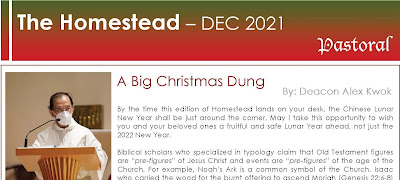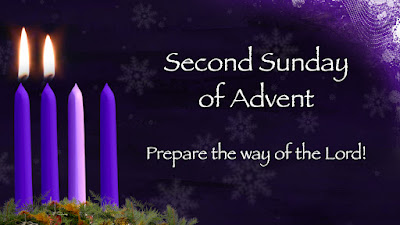常年期第三十一主日,乙年
主題:「不遠」有多遠?
在起初,世人誤會了天主,這誤會並非今時今日纔有的新事物。雖然聖經告訴我們,天主是按自己的肖像創造了人類(創1:26),但人類始終是有限的受造物,若不是天主主動把自己啟示給我們,要理解這位無限的造物主,談何容易!我們既有理智、意志和能力,當然可以從四周的事物,發現天主留下的蛛絲馬跡,認知祂的存在,並與祂建立關係,分享祂的永恆生命。這個認知是可能的,是「近取諸身,遠取諸物」(易‧繫辭下)的道理,也是「高天陳述天主的光榮,穹蒼宣揚祂手的化工」(詠19:2)的讚嘆!
誠然,知識有深淺的不同程度,而認知多少卻要看機會與意志。古人憑肉眼,所見的有限,沒有機會看見火星的兩個月亮或者土星的光環;即使攀到了山腰,究竟有沒有足夠的體力登上珠穆朗瑪峰,呼吸到完全沒有污染過的空氣,是意志所決定。宗教信仰也不例外,很多基督徒以為是耶穌基督教導門徒,上愛天主,下愛世人兩大誡命,殊不知這兩大誡命是梅瑟所教導(申6:4-5;肋19:18)。這的確是一場美麗的誤會,是很多基督徒不求甚解使然。其實,耶穌基督在「山中聖訓」已清楚表明祂來不是為廢除法律,而是來成全它(瑪5:17)。且看,在曠野中三次著名的試探中,耶穌基督祇引述【申命紀】的教訓來擊退魔鬼(4:1-11;路4:1-13),並沒有提出任何新見解。即是說,善用梅瑟的法律,足以抗拒魔鬼的誘惑,足以成義。奈何人類駕馭不了天主所賜予的自由,纔踏上自我毀滅之路!此外,耶穌基督並沒有廢除舊教,另起爐灶,自立一個新教派的打算!倘若有信徒說「新約」取代了「舊約」,所以不用再受舊約法律的束縛,不用遵守舊約的法律,或者選擇性地執行有利自己的舊約法律,實在有違耶穌基督的心意,是自欺欺人。相反,基督徒應以耶穌基督所教導的福音精神,履行舊約的規定。例如,基督徒應該奉主日為聖日,是他們的安息日,放下一切不必要的工作,慶祝耶穌基督的復活和我們所獲得的自由!
今天所讀的福音,恰巧記載了一位經師挑戰耶穌基督,甚麼是「第一條誡命」(谷12:28-34),給我們一個默想耶穌基督心意的機會。在默想前,且讓我們參考以下表格,澄清一些疑問。
| 申6:5 | 瑪22:37 | 谷12:30 | 路10:27 |
| 全心 | ✔ | ✔ | ✔ | ✔ |
| 全靈 | ✔ | ✔ | ✔ | ✔ |
| 全意 | | ✔ | ✔ | ✔ |
| 全力 | ✔ | | ✔ | ✔ |
【申命紀】和【瑪竇福音】的讀者,是猶太文化背景的,所以,「全心、全靈、全力」已經足以表達整個人。又時移世易,【瑪竇】以「全意」取代了「全力」(【七十賢士本 LXX】也是「全力」)。【馬爾谷】與【路加】是寫給外邦人的,他們受希臘文化影響,以「全心、全靈、全意、全力」,纔能足以代表整個人。馬爾谷和路加,有擅自纂改添加天主說話的嫌疑嗎?沒有!
天主的救恩,先啟示給以色列人,於是在起初,猶太文化的氣色濃厚,祇用三個元素去表達整個人。但天主的救恩豈可以局限在以色列呢?所以,耶穌基督把這誡命「成全」,加入已廣為猶太人所接受的「全意」,使它圓滿,是很有意義的。至於「全意、全力」在【馬爾谷】和【路加】的次序不同,有機會再討論。
文化的差異對「人是甚麼」有不同的看法,這是最合理不過了。以中國文化為例,我們有「魂魄」的觀念,卻沒有「靈魂」的觀念。儒家思想強調「格物致知,誠意正心」(禮記‧大學),與希臘文化的心、意、力的觀念相近,或許也有能力領會第一條誡命了。中國文化與猶太文化都是較為具體務實,抽象的哲理不多,人倫美德的教訓倒不少。少談抽象的心,多說「惻隱之心、羞惡之心、是非之心、辭讓之心」,「人之有是四端者,猶其有四體也」(孟子‧公孫丑上)。所以,在理解最大的誡命時,也許能另闢蹊徑。
其實,申命紀的誡命原文有「你」,是務實的,不能推卸的。但經師的回覆,「不錯,師傅說的實在對:他是唯一的,除他以外,再沒有別的:應以全心、全意、全力愛他,並愛近人如自己」(谷12:32-33)失去了「你」,變得抽離。雖然這種演繹足以應用到一切人身上,卻不與任何一個人扯上關係,真是可惜!倘若經師忘記補上一句「因為我喜歡仁愛勝過祭獻,喜歡人認識天主勝過全燔祭」(歐6:6),恐怕主耶穌基督不會覺得他答得明智,也不會說一句「你離天主的國不遠了。」(谷12:34)
的確,在物理的距離上,這經師與天主子耶穌基督──祂就是天國具體的化身──近在「咫尺」,真是離天主的國不遠!可是,他仍未能脫離猶太權貴的利益集團,與主耶穌對抗,站在基督的對立面,喪失了與天主子結合的機會。所以,在靈性上,這個「不遠」,是「天涯」的不遠!「天涯的不遠」是甚麼意思?因為在天主眼中,千里不外乎咫尺!天主是永恆的,沒有我們人類的時間觀念;祂更是無處不在的,所以祂更沒有人類的空間觀念。為主耶穌基督,天涯祇是咫尺而已。至於我們,所謂「人心隔肚皮」,即使親密如夫妻兄弟,也可以沒有溝通交流,孤獨在人群之中,真是咫尺猶如千里!志同道合的戰友,雖然萬水千山隔阻,仍可交心,不愁寂寞,確是千里猶如咫尺!
所以,各位兄弟姊妹,希望那位經師和所有的基督徒,不要因耶穌基督的讚賞而沾沾自喜。天主是慈悲的,萬里千年也阻不了祂對罪人的愛;但我們始終是微不足道的有限受造物。我們真的要加倍努力,鍥而不捨,憑天主聖神的助祐,纔能寸進!
天主保祐!
2018年反省
圖片鳴謝:free.messianicbible.com
Thirty First Ordinary Sunday, Year B
Theme: How Far is “Not Far”?
In the beginning, mankind misunderstood God. This misunderstanding is not something new, something peculiar to the modern world. Although the Bible tells us that God created mankind in His own image (Genesis 1:26), humanity is after all a finite creature. Had the infinite God not taken the initiative to reveal Himself, we would never have been able to know Him! We are gifted with rationality, will and strength. Surely we are able to detect clues left behind by God, to know of His existence, to establish relationship with Him and partake in His eternal life. This knowledge is possible. It is the logic of “Taking nearby clues from our body and far off clues from things outside” (I-Ching Commentary). It is also the awe expressed in “The heavens declare the glory of God; the firmament proclaims the works of His hands.” (Psalm 19:2)
Indeed, knowledge can be shallow or deep but how much one is able to attain depends on opportunities and will power. Ancient people did not have the opportunity to see the 2 moons of Mars or the spectacular Saturn ring. Even if one has reached mid-hill, whether one is able to climb to the top of Mount Everest and breathes in the immaculate air depends on whether one has enough will and strength. Religious faiths are no exception. Many Christians think that Jesus Christ teaches His disciples the two greatest commandments: to love God above all and to love their neighbour. Unbeknown to them, it was Moses who handed these two commandments down (Deuteronomy 65:4-5, Leviticus 19:18). This is truly a happy misunderstanding because many a Christian is not diligent enough to study the Bible. In fact, in the Sermon on the Mount, Jesus Christ made it clear that He had no intention to abolish the Mosaic Law but to fulfil (Matthew 5:17). Take a look at the three famous temptations in the wilderness. Jesus only quoted passages from Deuteronomy to defeat the Devil (4:1-11, Luke 4:1-12). He did not propose any new teachings. That is to say, making good use of the Mosaic Law is sufficient to overcome the Devil’s temptations and is sufficient to be justified. It’s a pity that humanity is unable to manage the freedom given by God and races towards self-destruction! Thus, if any believer claims that the New Testament has replaced the Old Testament whose laws have no binding on him, that he has no obligation to observe them or selectively obeys those laws which are advantageous to them, he is cheating himself because this is not what Christ wants. On the contrary, we should observe the laws in the Old Testament in the spirit of the gospels. For example, we should make Sunday holy and our Sabbath. Put down unnecessary labour to celebrate the resurrection of Jesus Christ and our liberation!
In the gospel passage today, one of the scribes came to challenge Jesus, asking him what the “First Commandment” was (Mark 12:28-34). It provides us with an opportunity to meditate what is in Jesus’ mind. Before we meditate, let us clarify some points from the table below.
| Deuteronomy 6:5 | Matthewn22:37 | Mark 12:30 | Luke 10:27 |
| all heart | ✔ | ✔ | ✔ | ✔ |
| all soul | ✔ | ✔ | ✔ | ✔ |
| all mind | | ✔ | ✔ | ✔ |
| all strength | ✔ | | ✔ | ✔ |
Deuteronomy and Matthew were written for readers from Jewish background. Thus, “with all your heart, with all your soul, with all your strength” was sufficient to represent the whole person. Time changes. Matthew replaces “all your strength” with “all your mind”. (The Septuagint LXX still retains “all your strength”). Mark and Luke wrote for the Gentiles who were living in the Greek civilization. Therefore, in order to represent the whole person, one needs “with all your heart, with all your soul, with all your mind and with all your strength”. Were Mark and Luke guilty of putting words into God’s mouth? NO!
At first, God revealed His salvation to the Israelites. Thus, the Jewish flavour was heavy and three elements were sufficient to represent the whole person. But God’s salvation is not confined to Israel. Thus, Jesus came to fulfil the law and to enrich the commandment with what the Jews have already accepted by adding the “all your mind”. It is truly meaningful. As for the order of “mind” and “strength”, Mark and Luke are different. Maybe we’ll meditate on this when the opportunity arises.
It is only natural for different cultures to have different conceptions of what man is! Take the Chinese culture for example. We have the concept of “Húnpò” but not the concept of souls. Confucianism emphasizes on “Investigate the nature of things, pursue knowledge, act in good faith and rectify one’s mind…” (Major Studies, the Book of Rites). These concepts are similar to the Greek concepts of heart, mind and strength. Perhaps the Chinese too are capable of discussing the First Commandment. Both the Chinese and Jewish cultures are pragmatic and concrete. There are few abstract world-views but many interpersonal moralistic advices. We seldom speak of heart in abstraction, but “heart of mercy, heart of conscience, heart of righteousness, heart of humility”, “These four hearts are like our four limbs” (I Gōngsūn Chǒu, Mencius). Perhaps the Chinese are able to break new path in understanding the First Commandment.
In fact, there is a “you” in the Deuteronomy version. It is pragmatic and nobody may evade. However, the “you” was missing in the scribe’s answer: “Well said, teacher. You are right in saying, ‘He is One and there is no other than He.’ And ‘to love him with all your heart, with all your understanding, with all your strength, and to love your neighbour as yourself’ is worth more than all burnt offerings and sacrifices.” (Mark 12:32-33) It is detached. Although this rendering is applicable to all peoples, it pinpoints nobody. What a pity! Had the scribe forgotten to add “For it is loyalty that I desire, not sacrifice, and knowledge of God rather than burnt offerings” (Hosea 6:6), Jesus would not have seen that he answered with understanding and said, “You are not far from the kingdom of God.” (Mark 12:34)
In fact, physically speaking, this scribe was in the proximity of the Son of God, Jesus Christ who is a concrete embodiment of the kingdom of God. He was truly not far away from the kingdom of God. However, he was inside the Jewish authoritative corporate which stood in opposition to Jesus. The scribe missed the opportunity to be in communion with the Son of God. Therefore, spiritually, this “not far away” was actually an unsurpassable “not far away”! What does this unsurpassable “not far away” mean? God is eternal. He has no human concept of time. He is omnipresent. Thus He even does not have the human concept of space. For Lord Jesus Christ, no unsurpassable abyss is too far away. However, we human beings are not connected. Even intimate couples and siblings do not communicate. They feel lonely in the crowd. Their “not far away” is an unsurpassable abyss! For comrades of like-mind, even though they are physically scattered as fugitives all over the world, they are not alone. Their separations are “not far away”!
Brethren, I hope the scribe and all Christians do not congratulate themselves too soon because of Jesus’ praises. God is merciful. Millions of miles and ages are not able to obscure His love of sinners. But we are negligible finite creatures. We need to work extra hard in perseverance with the support of the Holy Spirit to inch towards our sanctification!
God bless!





















